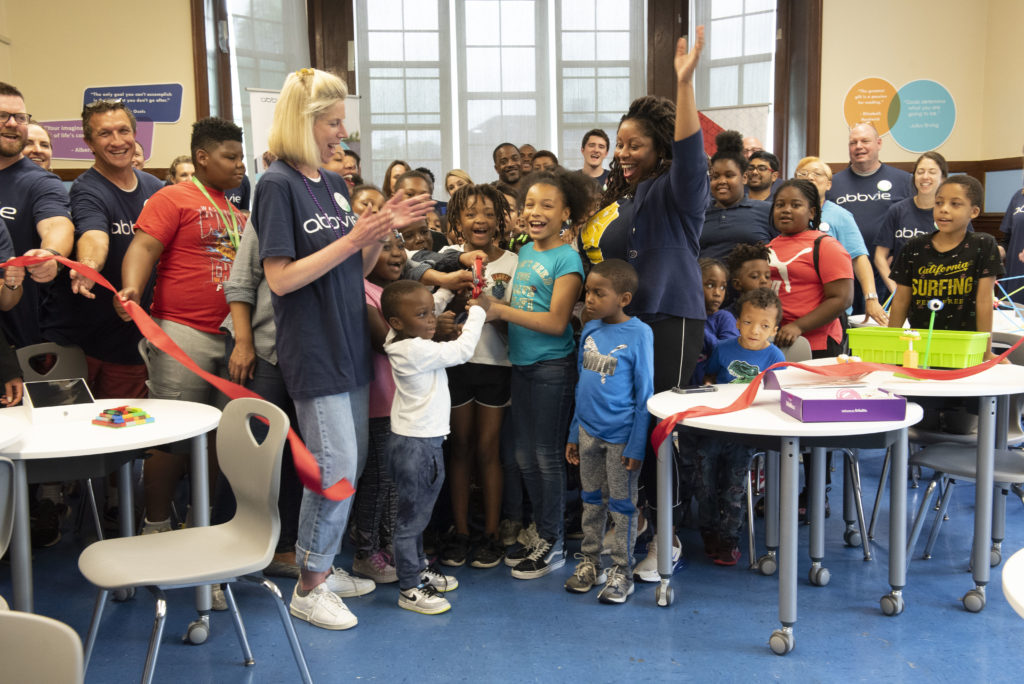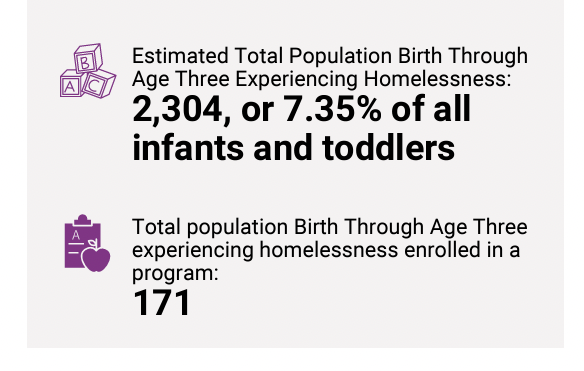Ketcham Elementary School in Ward 8’s historic Anacostia neighborhood just turned a cluttered old library room into a bright new STEM lab, replete with new iPads, robots and 3D printers — all thanks to a partnership with two regional organizations that organized a one-day volunteer blitz.
The school has traditionally served many children dealing with adversity. As of the 2018-19 school year, 19 percent of the student population was homeless, 90 percent were considered at risk, and all students were eligible for free and reduced-price meals.
While the number of homeless students is still an unfortunate figure, it’s down significantly from the 2014-15 year, when an NPR article reported that nearly a third of the 300-plus student population was experiencing homelessness. At the time the city’s largest family shelter, D.C. General, was still in operation and many Ketcham students lived there. The facility closed last October.
The challenges of serving so many children in need has not swayed the school’s faculty and staff from working to offer their students a quality educational experience — in part by forging community partnerships. Ketcham’s science, technology, engineering, and mathematics lab was enhanced in a single day this month, but that’s only the latest example of projects and gifts that have helped the school provide students with the resources and opportunities necessary to help them succeed no matter their circumstances.
“A lot of times in schools with high poverty, people want kids to just ‘do, do, do,’ but we’re not teaching them how to think,” said Principal Maisha Riddlesprigger, who has been at Ketcham for six years and was recently named D.C. Public Schools Principal of the Year for 2019. “We have a real commitment to teaching kids how to think about learning, so that they not only develop a joy for learning but … are also engaged in the process.”
In an op-ed Riddlesprigger wrote last year, she explained that the high proportion of Ketcham students who have had adverse childhood experiences makes her role as an educator more complex. She and her team have nevertheless made significant progress in catering to students who could be considered the “furthest from opportunity,” she wrote.
Quality teaching is a major emphasis for Riddlesprigger. Another aspect of her vision for improving children’s education is the cultivation of quality learning environments and pathways.
In February, Ketcham opened a new child care center that provides a 10-year pathway of instruction at the school, including child care and pre-kindergarten; Mayor Muriel Bowser and new Chancellor Lewis D. Ferebee attended a ceremony that marked its debut. The school year ended on another high note, with the Heart of America Foundation and regional employees of the biopharmaceutical company AbbVie joining together with Ketcham’s staff on June 13 to clean out, expand and restore the former library room.
More than 50 volunteers from AbbVie, many of whom are D.C. residents, spent the morning painting, building and moving furniture; deep-cleaning fixtures and windows; arranging artwork; and assembling technology. They also took part in campus-wide beautification projects such as painting murals, and they assembled tote bags filled with books and supplies for students to take home.
It was the company’s annual “Week of Possibilities,” during which around 9,000 employees in the U.S. and abroad give back to their local communities. Several of their projects over the years have taken place at low-income schools.
“It’s great to see the transformative effect you can have in just a few hours of work,” said Courtney Piron, Vice President of Federal Government Affairs for AbbVie. She volunteered alongside several of her colleagues from the company’s District office in Northwest D.C.

The Heart of America Foundation, located in Landover, Maryland, has partnered with AbbVie to help facilitate the company’s volunteer week for many years. The nonprofit specializes in transforming spaces at underresourced schools into modern, more inviting environments.
John Flynn, Heart of America’s vice president for innovation, said the organization’s mission is to “create inspiring learning environments that provide access to tools that kids in the communities we serve don’t typically have.”
Flynn said the end goal of projects such as this is to “level the playing field” when it comes to providing all students with the proper resources to fit their needs.
Speaking to the volunteers before they got to work, Ward 8 Councilmember Trayon White Sr. was enthusiastic the two organizations chose to take up this project. He thanked them for creating an environment that will inspire students to explore new careers and opportunities.
“Technology allows individuals to explore things around the world,” White said. “While we are confined in a physical space, the development of this new STEM lab will allow access for these students to gain more insight on careers in engineering, science, technology, math, and find some non-typical careers right here from the lab.”
When the volunteers had finished up after about four and a half hours of work, a group of curious students walked through a high-fiving human tunnel of volunteers and into the new space. The space itself is two to three times larger than it was previously, giving students a better opportunity to incorporate reading alongside the usual STEM-related areas of focus.

“This is going to be your new space to make things happen.” Riddlesprigger told the students. “All of this, and all of these people that are here, are for you.”
Riddlesprigger went on to ask the students how they felt about their new lab and the effort that went into making it. Among the answers: “Happy.” “Supported.” “Special.” “Good.”
Although the lab equipment is geared toward helping students engage with math and science, Ketcham also aims to use spaces like this to support the overall well-being of all students, particularly those who experience instability outside the classroom.
Homelessness can adversely affect a young child’s academic achievement, physical health, and development. Many students experiencing homelessness suffer from frequent absenteeism or the inability to concentrate or properly emote their thoughts and feelings.
According to data from the Office of the State Superintendent of Education, approximately 3,713 DCPS students overall experienced homelessness during the 2016-17 school year. Under U.S. Department of Education guidelines, the number includes families who are “doubled up” — meaning that they live with relatives or friends out of economic necessity.
Shayne Wells, the press secretary for DCPS, stressed the importance of city agencies and nonprofit partners meeting the needs that students have while they are at school. Projects like this one create a better chance for students to focus on their studies without having to worry as much about their external situations, he said.
At Ketcham, Riddlesprigger and her team have witnessed many ways in which homelessness affects the way their students learn and behave.
“When you’re a student facing homelessness, you get an anxiety,” she said. “It’s an anxiety not knowing where you’re going to sleep, not knowing what might happen the next day, not knowing where your next meal is going to come from.”
Jamilla Coleman, the librarian and media specialist at Ketcham, has been at the school for four years and said she was not initially aware of the sizable population of homeless students there. When she did find out, it became easier to pick up on patterns in behavior.
Coleman said that she is grateful to be working at a school like Ketcham, where the issue of homelessness is handled with sensitivity, support and awareness. She said the new STEM lab will empower the school’s students and better prepare them for adulthood.
“These are the tools that our kids need in order to compete with their peers in other areas,” Coleman said, “so I feel that giving them these skills and at least encouraging or planting that curiosity in them is something that we’re doing to better equip them and empower later on in their lives.”
Riddlesprigger believes the creation of spaces such as this in particular helps homeless students because it provides stability, comfort and safety that might not be available to them when it’s time to go home.
“It really makes us excited to be able to have a space that’s as nice and new as this,” she said. “Especially for a population of students where ‘new’ might not even be an option.”
This article was co-published with TheDCLine.org








